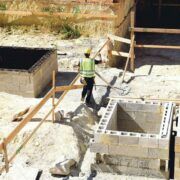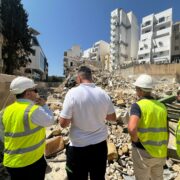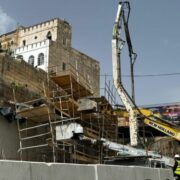PR 01/21 | KTP welcomes adoption of its proposals during parliamentary speech introducing Construction Bill
The Kamra tal-Periti recognises yesterday’s introduction in Parliament of the Bill to establish the Building and Construction Authority as the achievement of a long-awaited milestone. It commends Parliamentary Secretary Chris Agius for this important step and pledges its full cooperation towards a successful implementation.
The Kamra is encouraged by the fact that the Bill was clearly influenced by its proposal document and the presentation given to the Prime Minister’s Technical Committee last March, as evidenced by the adoption, at least in principle, of several of its recommendations.
Indeed, Hon. Agius echoed in his speech almost every principle contained in the Kamra’s proposal document: A Modern Building and Construction Regulation Framework for Malta. This was a highly rewarding moment for the Kamra as well as the Profession, which had endorsed the Kamra’s framework at three consecutive General Meetings.
The Kamra shall be proposing additions to the Bill to emphasise the need for separation in the Act between building regulations, which govern design standards falling within the remit of architects and engineers, and construction regulations, which govern construction safety, methodology, and processes falling under the responsibility of contractors.
This pertinent differentiation is an integral part of the ten fundamental principles set out in the Kamra’s framework document and was agreed to by Government in its Letter of Commitment of 2nd August 2019. The Kamra looks forward to collaborating with Government in the coming days in order to address this with a view to ensuring that our country can be supported with the best possible legislation in the years ahead: this in the interest of public safety.
It must be stressed, however, that the passing of this Bill represents the first of a number of milestones in the long journey the industry faces in modernising and reaching European standards.
The success of this journey will depend on the quality of the regulations and subsidiary legislation that will follow this Act. The Kamra augurs that the focus of these regulations and subsidiary legislation will be placed on accident prevention in the interest of public safety, rather than simply listing stakeholders’ responsibilities to ascribe blame in the aftermath of an incident. To this end, the Profession eagerly anticipates the introduction of competent systems based on international best practices which envisage building control processes aimed at preventing accidents by means of rigorous in-built checks-and-balances, as well as the licensing of unregulated stakeholders.
The ten important principles contained within A Modern Building and Construction Regulation Framework for Malta:
- The separation of planning permit and building permit processes;
- Clear well-organised regulatory processes designed to promote public safety, and quality, in the interest of the consumer, rather than being focused on ascribing blame post-accident;
- Clear distinction between the regulations governing building (the permanent works) and those governing construction processes and temporary works.
- The BCA is to take on the consolidated role of the assessment of buildings, building authorisations, enforcement, and monitoring of the construction processes, with the 22 public entities hitherto entrusted with the different areas of interest, becoming key stakeholders in the drafting of regulations and guidance documents
- Major projects and public buildings to be subjected to an independent review, particularly in terms of structural design and fire engineering through the introduction of a new professional figure (Engineering Auditor).
- Contractors to be solely responsible for the process of construction, including temporary works, and would therefore have full possession of construction sites for the duration of the works. They would obviously need to have specific skills, and should therefore be classified and licensed according to such skills.
- The enforcement of construction regulations to be delegated to private service providers, licensed by the BCA, referred to as Building and Construction Inspectors (BCIs).
- Contractors to be required to certify that the executed works comply with the design instructions, and with the requirements of the Construction Products Directive.
- The construction phase will be concluded by the issuance by the BCA of a Compliance Certificate, which, inter alia, authorises that the building can be brought into use.
- Post-occupancy checks and audits to be undertaken as pre-determined by the BCA to ensure the continued compliance of the structure with building regulations.











